Autophagy promotes immune evasion of pancreatic cancer by degrading MHC-I
- PMID: 32376951
- PMCID: PMC7296553
- DOI: 10.1038/s41586-020-2229-5
Autophagy promotes immune evasion of pancreatic cancer by degrading MHC-I
Abstract
Immune evasion is a major obstacle for cancer treatment. Common mechanisms of evasion include impaired antigen presentation caused by mutations or loss of heterozygosity of the major histocompatibility complex class I (MHC-I), which has been implicated in resistance to immune checkpoint blockade (ICB) therapy1-3. However, in pancreatic ductal adenocarcinoma (PDAC), which is resistant to most therapies including ICB4, mutations that cause loss of MHC-I are rarely found5 despite the frequent downregulation of MHC-I expression6-8. Here we show that, in PDAC, MHC-I molecules are selectively targeted for lysosomal degradation by an autophagy-dependent mechanism that involves the autophagy cargo receptor NBR1. PDAC cells display reduced expression of MHC-I at the cell surface and instead demonstrate predominant localization within autophagosomes and lysosomes. Notably, inhibition of autophagy restores surface levels of MHC-I and leads to improved antigen presentation, enhanced anti-tumour T cell responses and reduced tumour growth in syngeneic host mice. Accordingly, the anti-tumour effects of autophagy inhibition are reversed by depleting CD8+ T cells or reducing surface expression of MHC-I. Inhibition of autophagy, either genetically or pharmacologically with chloroquine, synergizes with dual ICB therapy (anti-PD1 and anti-CTLA4 antibodies), and leads to an enhanced anti-tumour immune response. Our findings demonstrate a role for enhanced autophagy or lysosome function in immune evasion by selective targeting of MHC-I molecules for degradation, and provide a rationale for the combination of autophagy inhibition and dual ICB therapy as a therapeutic strategy against PDAC.
Conflict of interest statement
Competing interests
A.C.K. has financial interests in Vescor Therapeutics, LLC. A.C.K. is an inventor on patents pertaining to KRAS regulated metabolic pathways, redox control pathways in pancreatic cancer, targeting GOT1 as a therapeutic approach, and the autophagic control of iron metabolism. A.C.K. is on the SAB of Rafael/Cornerstone Pharmaceuticals. A.C.K. is a consultant for Deciphera. J.D. is on the Scientific Advisory Board of Vescor Therapeutics, LLC. The other authors declare no competing interests.
Figures

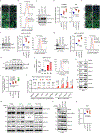


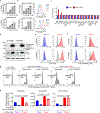
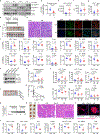
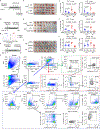


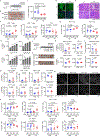



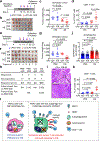
Comment in
-
Pancreatic cancer hidden in plain sight.Nature. 2020 May;581(7806):34-35. doi: 10.1038/d41586-020-01103-3. Nature. 2020. PMID: 32322029 No abstract available.
-
PDAC resistance to immunotherapy - a role for autophagy?Nat Rev Gastroenterol Hepatol. 2020 Jul;17(7):382. doi: 10.1038/s41575-020-0318-4. Nat Rev Gastroenterol Hepatol. 2020. PMID: 32433530 No abstract available.
-
Seeking Cellular Fitness and Immune Evasion: Autophagy in Pancreatic Carcinoma.Cancer Cell. 2020 Jun 8;37(6):759-760. doi: 10.1016/j.ccell.2020.05.009. Epub 2020 May 28. Cancer Cell. 2020. PMID: 32470391
-
Eating self for not be eaten: Pancreatic cancer suppresses self-immunogenicity by autophagy-mediated MHC-I degradation.Signal Transduct Target Ther. 2020 Jun 12;5(1):94. doi: 10.1038/s41392-020-0209-8. Signal Transduct Target Ther. 2020. PMID: 32532955 Free PMC article. No abstract available.
-
Selective Autophagy Conceals the Enemy: Why Cytotoxic T Cells Don't (MH)C Pancreatic Cancer.Mol Cell. 2020 Jul 2;79(1):6-8. doi: 10.1016/j.molcel.2020.06.009. Mol Cell. 2020. PMID: 32619471
-
Is targeting autophagy a promising lead to unveil the cloak of invisibility in pancreatic cancer?Clin Res Hepatol Gastroenterol. 2021 Nov;45(6):101622. doi: 10.1016/j.clinre.2021.101622. Epub 2021 Mar 23. Clin Res Hepatol Gastroenterol. 2021. PMID: 33770630
References
-
- Rodig SJ et al. MHC proteins confer differential sensitivity to CTLA-4 and PD-1 blockade in untreated metastatic melanoma. Sci Transl Med 10, eaar3342 (2018). - PubMed
References for Methods
-
- Kaizuka T et al. An Autophagic Flux Probe that Releases an Internal Control. Mol Cell 64, 835–849 (2016). - PubMed
Publication types
MeSH terms
Substances
Grants and funding
- T32 CA009161/CA/NCI NIH HHS/United States
- P30 CA016087/CA/NCI NIH HHS/United States
- P30 DK063720/DK/NIDDK NIH HHS/United States
- R01 CA126792/CA/NCI NIH HHS/United States
- R35 CA232124/CA/NCI NIH HHS/United States
- R01 CA157490/CA/NCI NIH HHS/United States
- T32 GM008568/GM/NIGMS NIH HHS/United States
- R01 CA188048/CA/NCI NIH HHS/United States
- R01 GM132129/GM/NIGMS NIH HHS/United States
- F99 CA245822/CA/NCI NIH HHS/United States
- P01 CA117969/CA/NCI NIH HHS/United States
- DP2 CA216364/CA/NCI NIH HHS/United States
- R01 GM095567/GM/NIGMS NIH HHS/United States
LinkOut - more resources
Full Text Sources
Other Literature Sources
Medical
Molecular Biology Databases
Research Materials

